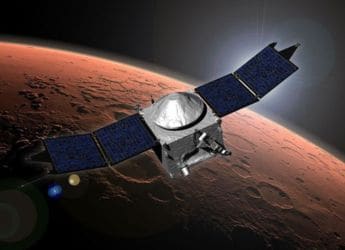- Home
- Internet
- Internet News
- Amazon, Microsoft Jostle as Pentagon Calls for Cloud Contract Bids
Amazon, Microsoft Jostle as Pentagon Calls for Cloud Contract Bids

US defence officials unveiled Thursday a much-anticipated final request for tech firms to bid on a massive contract to provide the Pentagon with a comprehensive cloud computing service.
Tech titans including Amazon and Microsoft have already spent months jockeying for a winning offer on the prestigious contract, which could be worth as much as $10 billion (roughly Rs. 68,500 crores) over a decade.
The Joint Enterprise Defense Infrastructure, better known by its nerdy name JEDI Cloud Program, ultimately will see all military branches sharing information in one system that can be scoured in real time with the help of artificial intelligence.
Currently, the Navy, Air Force and Army use separate clouds, so the benefits of immediately shared information, for instance by a pilot, could be huge.
He or she might have instant access to data collected by troops on the ground, a drone or a ship at sea, speeding the flow of vital intelligence.
Pentagon Chief Information Officer Dana Deasy said the Defense Department is appealing to outside firms because it needs help learning how to put in place a cloud of this scope.
"Battlefield advantage is driven by who has access to the best information that can then be analyzed to inform decision-making at the point of time and need," Deasy said.
While JEDI will play a key role for future cloud needs, officials noted the Pentagon will continue to operate multiple cloud systems, for now at least.
Tech firms including Microsoft and Amazon have in recent weeks festooned the metro stop underneath the Pentagon with advertisements boasting of their cloud prowess, no doubt hoping to catch the eye of decision-makers in the building.
The contract will have an initial duration of two years, but can be renewed for various amounts of time up to 10 years.
And of course the bid winner will have a foot in the Pentagon door, potentially leading to other lucrative defence contracts.
A Silicon Valley backlash in recent months has seen thousands of tech workers protest their companies getting involved with the Pentagon.
In May, Google workers signed a petition protesting the firm's involvement with the military in developing artificial intelligence to make US military drones better at recognizing what they are monitoring.
Google last month said it would not use AI for weapons or to "cause or directly facilitate injury to people," as it unveiled a set of principles for the technologies.
Get your daily dose of tech news, reviews, and insights, in under 80 characters on Gadgets 360 Turbo. Connect with fellow tech lovers on our Forum. Follow us on X, Facebook, WhatsApp, Threads and Google News for instant updates. Catch all the action on our YouTube channel.
Related Stories
- Samsung Galaxy Unpacked 2025
- ChatGPT
- Redmi Note 14 Pro+
- iPhone 16
- Apple Vision Pro
- Oneplus 12
- OnePlus Nord CE 3 Lite 5G
- iPhone 13
- Xiaomi 14 Pro
- Oppo Find N3
- Tecno Spark Go (2023)
- Realme V30
- Best Phones Under 25000
- Samsung Galaxy S24 Series
- Cryptocurrency
- iQoo 12
- Samsung Galaxy S24 Ultra
- Giottus
- Samsung Galaxy Z Flip 5
- Apple 'Scary Fast'
- Housefull 5
- GoPro Hero 12 Black Review
- Invincible Season 2
- JioGlass
- HD Ready TV
- Laptop Under 50000
- Smartwatch Under 10000
- Latest Mobile Phones
- Compare Phones
- Realme Neo 8
- OPPO Reno 15 FS
- Red Magic 11 Air
- Honor Magic 8 RSR Porsche Design
- Honor Magic 8 Pro Air
- Infinix Note Edge
- Lava Blaze Duo 3
- Tecno Spark Go 3
- HP HyperX Omen 15
- Acer Chromebook 311 (2026)
- Lenovo Idea Tab Plus
- Realme Pad 3
- HMD Watch P1
- HMD Watch X1
- Haier H5E Series
- Acerpure Nitro Z Series 100-inch QLED TV
- Asus ROG Ally
- Nintendo Switch Lite
- Haier 1.6 Ton 5 Star Inverter Split AC (HSU19G-MZAID5BN-INV)
- Haier 1.6 Ton 5 Star Inverter Split AC (HSU19G-MZAIM5BN-INV)

















